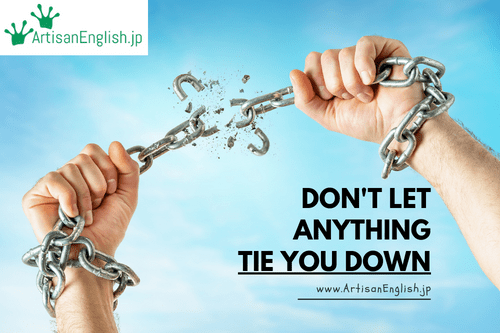
YouTube / iTunes / Spotify / Radio Public / Pocket Casts / Google Podcasts / Breaker / Overcast
Listen to ArtisanEnglish.jp posts & lesson intros here.
Phrase: Tie you down
The phrase tie you down is often used to describe a situation where someone or something is holding you back from achieving your goals or living the life you desire.
It can refer to various circumstances, such as a job that requires long hours and limits your free time, a suffocating or controlling relationship, or a financial burden that prevents you from pursuing your passions.
At its core, the term tie you down implies a sense of restriction or limitation.
It suggests that something prevents you from being your best self or reaching your full potential.
This can be frustrating and discouraging, especially if you feel trapped in a situation you cannot easily escape.
However, it is important to note that not all ties are negative or harmful.
Sometimes, being tied down can be a positive thing.
For example, a committed relationship can provide stability, support, and a sense of belonging.
A challenging job can help you grow and develop new skills.
And financial responsibilities can motivate you to work hard and make smart decisions.
The key is to recognize when a tie is holding you back and when it is propelling you forward.
If you feel like you are constantly struggling to break free from a negative situation, it may be time to reassess your priorities and make changes.
On the other hand, if you are feeling fulfilled and happy despite the challenges, then the tie may be a valuable part of your life.
Ultimately, the phrase tie you down reminds us that we all have the power to choose our path in life.
While external factors may influence our decisions, we are ultimately responsible for our happiness and success.
So, if you feel like something or someone is holding you back, take control of your life and make the changes necessary to break free and pursue your dreams.
Flesch-Kincaid Readability Test
This post is understandable by someone with at least an 8th-grade education (age 13 – 14).
On the Flesch-Kincaid reading-ease test, this post scores 64.
The easier a passage is to read, the higher the score on a scale of 0 – 100.

